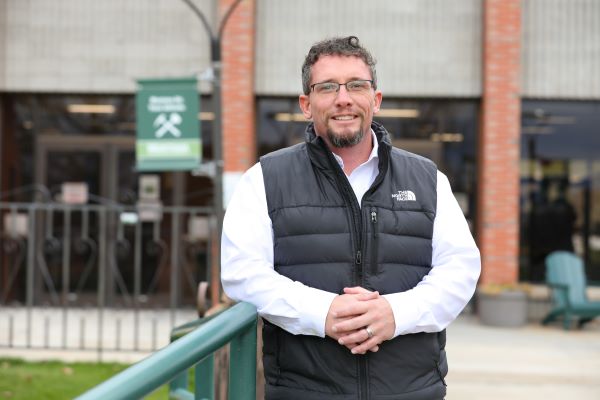Retired Army Staff Sergeant hopes Student Veteran Association will help connect service members, families with resources

If you ask Troy Springer how he’s doing these days, he will tell you he’s the best he’s ever been.
“I’m at a healthy point, probably the healthiest I’ve been in my life, even before the Army,” the Construction Management senior notes.
Springer is just as quick to note that it was a long journey to get to where he is today. He joined the United States Army in 2003, and rose to the rank of staff sergeant as he operated a tanker. He was deployed twice for combat in Iraq and Afghanistan. Additional overseas deployments included assignments in Kenya, Djibouti, Bahrain, and Kuwait. During that time, Springer received awards for performance, professionalism, and valor. By the time he medically retired in 2019, the 16 years of service had taken its toll.
“I was using unhealthy coping tools,” Springer said.
Lack of healthy coping skills contributed to divorce. Springer was also unable to give his four daughters and two stepchildren as much attention as he wanted.
By tapping into resources available through Veterans Affairs, Springer was able to make healthier choices. He reconnected with his wife and remarried. He’s active and engaged with his children, including a special needs daughter, who has a personal care assistant and is connected with every resource possible to make her life better. The family is working to make their entire home ADA-accessible for his daughter.
“It took a lot of self-awareness to get where we are today,” Springer said. “Montana brought us back together. We are confident to be coming out on the opposite side of it. Hopefully, by 2025, we’re both graduated, and going into second careers.”
Springer’s wife is enrolled in the Environmental Engineering program at Montana Tech. His oldest children are receiving veteran benefits at other universities as well to help pay for their education.
“If it weren’t for my wife, I wouldn’t be where I’m today,” Springer said. “The kids, they suffer, and they deserve the world. The stipend they receive to go to school is the biggest relief for me. They are starting a life that I didn’t have means to give them otherwise, which means the world to me.”
His advice to other veterans is to not deteriorate in isolation.
“My best advice would be to get connected. Whether you are in your 20s or your 40s, go talk to the actual VA clinic in person,” Springer said. “It’s rough being in the Army. Your body is exposed to heavy work. Whether you realize it or not, there are effects on your physical and mental health. There are people to help you get medical attention and receive help. Go there and talk to them.”
Springer is currently the vice president of the recently formed Student Veterans Association on campus. Springer and his fellow veterans hope they can help build a sense of community amongst former service members and their family members.
While Springer’s college experience has been positive, he knows that’s not the case for all veterans. Understanding benefits can be difficult. Sometimes younger service members struggle with guilt that they haven’t suffered as much as veterans from conflicts decades ago, and are misguided into not utilizing what is available. Having a group of fellow veterans can help alleviate those struggles.
In addition to having each other as a network of support to access resources, Springer would like the group to eventually enjoy relaxing activities together.
“To hike with a group of veterans would be amazing,” Springer said. “That extreme relaxation you get when you jump in the cold brisk lake, it’s probably one of the best coping mechanisms you can get. You go back to what you know, setting up a camp, just making a fire. I have friends from my time in the Army. They just aren’t here; they are throughout the states. If I had a million dollars, I’d fly them all out here for that experience, but that’s not feasible.”
Whether it’s joining the student organization, the Veterans of Foreign Wars, the American Legion, or the Marine Corps League, Springer recommends that veterans connect with other people.
“Just do it,” Springer said. “It might not feel comfortable at first. It still doesn’t feel 100% comfortable to me, but the isolation leads to a really negative spiral. That connection is more important than what you will ever admit it is.”
Student veterans or their families can contact Springer at tspringer@mtech.edu if they want to join the Student Veterans Association.
To learn about Veteran Services at Montana Tech, click here.